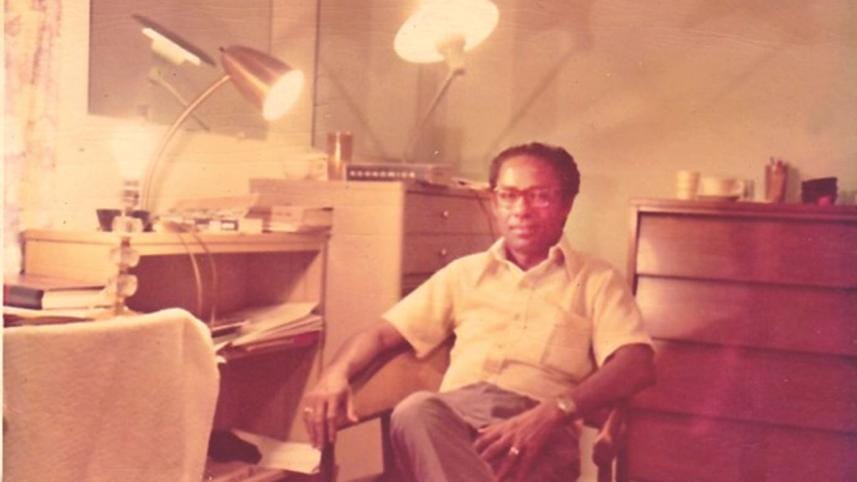The Treasury Officer and those dark days of March 1971

This is the story of my father who was a civil servant assigned as the treasury officer of Dhaka in 1971. It is a story of him and many others like him who selflessly struggled for freedom and independence of Bangladesh, who were not officially known as muktijoddahs or members of any political parties but believed in the future of Bangladesh and worked towards it.
As an East Pakistan civil servant, my father, M.A. Halim Chowdhury, could not be part of any political struggle nor could he openly express his opinion on the freedom struggle of the Bangalees that made headlines all over the world. But he felt that something needed to change so that Bangalees could get their right to freedom and speech. With that hope, he attended the historic speech of Bangabandhu Sheikh Mujibur Rahman at the Race Course Maidan on March 7, eluding the prying eyes of Pakistani agents to watch the great leader declare his directives for the Bangalee nation's freedom movement.
My father's hope for the declaration of independence had to wait, but upon return to his job as the Dhaka Treasury Officer, he observed that vast sums of funds were being diverted away from the Dhaka Treasury by various West Pakistan military units. He knew that this information had to be disseminated to the political leadership of the freedom struggle and he had to act upon it. But as a civil servant, he had to do this secretly or he could face execution by the military regime. He found a way to contact then General Secretary of the Awami League and subsequent prime minister of Bangladesh, Tajuddin Ahmad. Upon hearing the details from my father, this valiant leader of the freedom struggle actually smuggled him into the home of Sheikh Mujibur Rahman one evening, so that Bangabandhu himself could hear this information.
Like many others in the government, my father essentially followed the newly unrecognised government of Bangabandhu Sheikh Mujibur Rahman, trying his best to not perform on the directive of the military regime. He explained about the funds being withdrawn and informed Bangabandhu of the fact that Tikka Khan, the "Butcher of Balochistan", was positioning the military in a more permanent manner in East Pakistan. After listening to my father, Bangabandhu directed him with that clear voice that he is so well known for, "Halim shaheb, lock up the treasury door and disappear amidst the general public. The military will not be able to distinguish you from countless others."
I do not know what my father's exact course of action was during those days, but on the night of March 26, our government-allotted home was attacked by the Pakistani army. I was a small child then but I remember bullets flying all over and my uncle, a muktijoddha, whisking me to a room downstairs. The whole building started to burn as the army set fire to it from all directions. Ensuring the house was fully engulfed in fire, the army left the premises, thinking that no one would survive the inferno. They had guns but we had the Almighty's support on our side, as by some miracle a tank full of water and a few sand bags were discovered right outside our house. My father instructed all male adults to quickly get out of the house and start throwing sand and water on the burning building. Because of his quick action, four families were saved from certain death on that dreadful night. The families stayed in a single dark room of that half-burnt house for the next three days. Later, we evacuated to a relative's home far away on foot. The scene was not unlike the ones we currently witness on TV of refugees from Syria or other war-torn countries, seeking asylum elsewhere. Everywhere we looked, we saw burnt or smoldering storefronts and buildings in what is now known as the English Road in Old Dhaka. Later, we had to flee to our village in Comilla, as we, along with countless others were still being pursued by the Al Badar force and the Pakistani army.
We returned to Dhaka right after Victory Day on December 16, and my father found himself being called in by then Principal Secretary Rafiqullah Chaudhury to become the administrative officer of Gono Bhaban, the office of the Prime Minister of Bangladesh. He was dedicated to the office of the Prime Minister, and we found out later that one afternoon, while waiting beside the Prime Minister to get some documents signed, my father's appendix had ruptured. But even with that excruciating pain, he never left the Prime Minister's side until all the papers were signed and organised and the Prime Minister had left the Gono Bhaban. By the time my father could get out of the office a little before midnight, many hours had passed and his condition became critical. He spent the next few days in hospital but even there, he spoke of the PM's leadership and dedication for the war-torn country with hope and enthusiasm. Due to Bangabandhu's personality and leadership, everybody had high hopes for the bright future of Bangladesh. However, even today, over four decades after our independence, the vast majority of Bangladesh's population are still waiting for that "bright future" which our fathers had dreamt of and struggled for.
The writer is an IT professional.




 For all latest news, follow The Daily Star's Google News channel.
For all latest news, follow The Daily Star's Google News channel.
Comments